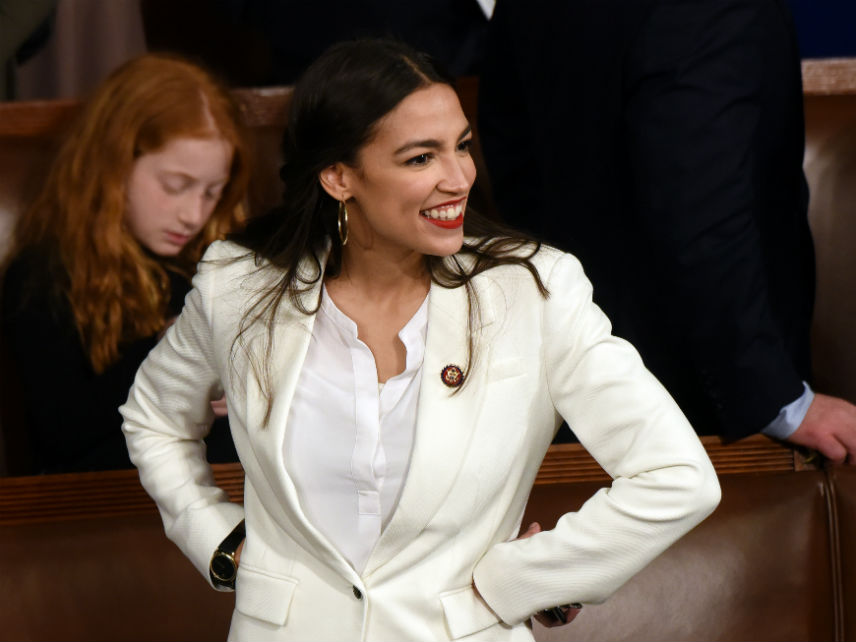No, Economists Don't Agree a 70 Percent Top Marginal Tax Rate Is a Good Idea
Sorry, Alexandria Ocasio-Cortez and Paul Krugman.

Economic commentators Matt Yglesias, Paul Krugman, and Noah Smith believe Rep. Alexandria Ocasio-Cortez's (D–N.Y.) call for a 60 to 70 percent top marginal income tax rate is uncontroversial. According to all three, the New York Democrat's proposal simply reflects the consensus of mainstream economics.
Their argument rests on two historical factoids. The first is that the rich paid higher taxes in the 1950s, and the economy grew just fine. The second "fact" is that an array of economists, from Nobel Prize winner Peter Diamond, to Thomas Piketty and Emmanuel Saez, have produced peer-reviewed research showing combined marginal rates as high as 70 to 80 percent are "optimal."
But dig into these three papers, and you'll find the results reflect philosophy as much as economics. These economists think they can plan the distribution of income to maximize "social welfare." But they arrive at the decision to impose extremely high top marginal tax rates because they uniformly decide to put almost zero weight on the welfare of the rich.
That means the sole aim of this cluster of economists is to maximize revenue collected from high earners in order to transfer to others. Presuming we could design a tax system from scratch that eliminates the possibility of people avoiding taxes or hiding or reclassifying income, they estimate the single combined marginal tax rate that would generate maximum revenue to "soak the rich." Incorporating other wishful thinking about how the rich respond to taxes, these economists wind up calculating that the "optimal" top tax rate is about 70 percent, if you are also willing to imagine closing off special treatment for capital gains and the possibility of incorporation.
The astute reader can probably see some problems with extrapolating from this theoretical calculation.
First, what if one thinks the welfare of the rich is actually an important policy consideration? According to a paper by Jonathan Gruber and Emmanuel Saez, if we instead pursued a "compassionate conservative" agenda—caring about the very poor a bit more than others in society, but everyone else equally, the optimal top rate might be as low as 30 percent. If we were philosophically opposed to redistribution altogether, the optimal rate tumbles to 3 percent. What counts as optimal varies tremendously based on the philosophical assumptions the economist starts with.
Second, what if we were not able to redesign the tax code to eliminate avoidance? A 73 percent rate, the optimal rate calculated by Diamond and Saez in 2011, is a combined rate (not just a marginal federal income tax rate, as Ocasio-Cortez seems to be proposing) that assumes we eliminate all deductions and exemptions. If we presume instead that the current deductions and exemptions continue, and high earners were as responsive to tax rates today as they were in the '80s, then the supposed optimal combined tax rate falls to 54 percent. After state, local, sales, and other taxes are taken into account, this translates to a top federal income tax rate of 48 percent—much higher than today's rate of 37 percent, but nowhere near the 60 to 70 percent rate advocated by Ocasio-Cortez. (Also notable: Phil Magness and Nick Gillespie have shown, very few people actually paid the highest rates in the 1950s, precisely because deductions and exemptions existed that these economists assume we'd be able to abolish.)
Third, these sorts of analyses tend to focus on (a) the very short-term, and (b) what to do with income after it's been produced. They do not ask why we receive income in a market economy. (Answer: because we produce something someone else wants or needs, generating consumer surplus.) The idea that the value of rich people to the rest of society solely rests on their tax contributions, as Krugman implies, is bizarre. In fact, the risk that higher tax rates might deter entrepreneurial activity by reducing the future payoff to innovation should worry us greatly. The economist Charles Jones thinks that incorporating this effect into the model might lower the optimal tax rate to 28 percent, simply because innovations—think Uber, Amazon—deliver huge gains to everyone.
This all might seem technical and theoretical, but it matters. Most of the venerated papers that seem to support super high tax rates for top earners assume we share progressive preferences, that we can implement a new wholly combined tax system (or hike other taxes) to eliminate the possibility of any form of tax planning, and that these huge tax hikes won't have longer term effects on growth or human capital accumulation.
Given all this, Krugman, Yglesias, and Smith could easily have said, "There's a progressive case, grounded in economics, for major tax reform, eliminating all deductions, and having one single progressive tax with very high rates, especially on top earners." But they could instead have said, "There's a progressive case, grounded in economics, for modestly higher top tax rates within the current code." But they cannot claim simultaneously that Ocasio-Cortez's big idea merely echoes the 1950s and that her recommendation is backed up by these economists.


Show Comments (186)